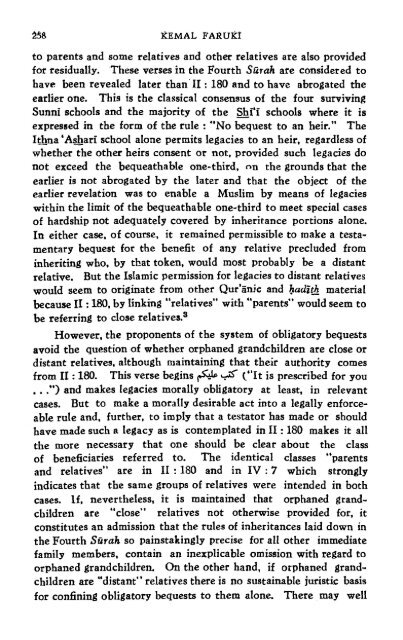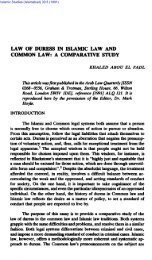ORPHANED GRANDCHILDREN IN ISLAMIC SUCCESSION LAW
ORPHANED GRANDCHILDREN IN ISLAMIC SUCCESSION LAW
ORPHANED GRANDCHILDREN IN ISLAMIC SUCCESSION LAW
Create successful ePaper yourself
Turn your PDF publications into a flip-book with our unique Google optimized e-Paper software.
to parents and some relatives and other relatives are also provided<br />
for residually. These verses in the Fourth Siirah are considered to<br />
have been revealed later than I1 : 180 and to have abrogated the<br />
earlier one. This is the classical consensus of the four surviving<br />
Sunni schools and the majority of the Si'i schools where it is<br />
expressed in the form of the rule : "No bequest to an heir." The<br />
Ihna 'A&ari school alone permits legacies to an heir, regardless of<br />
whether the other heirs consent or not, provided such legacies do<br />
not exceed the bequeathable one-third, nn the grounds that the<br />
earlier is not abrogated by the later and that the object of the<br />
earlier revelation was to enable a Muslim by means of legacies<br />
within the limit of the bequeathable one-third to meet special cases<br />
of hardship not adequately covered by inheritance portions alone.<br />
In either case. of course, it remained permissible to make a testa-<br />
mentary bequest for the benefit of any relative precluded from<br />
inheriting who. by that token, would most probably be a distant<br />
relative. But the Islamic permission for legacies to distant relatives<br />
seem to originate from other Qur'5nic and had?& material<br />
because I1 : 180. by linking "relatives" with "parents" would seem to<br />
be referring to close relative^.^<br />
However, the proponents of the system of obligatory bequests<br />
avoid the question of whether orphaned grandchildren are close or<br />
distant relatives, although maintaining that their authority comes<br />
from 11 : 180. This verse begins @ 4 ("It is prescribed for you<br />
. . .") and makes legacies morally obligatory at least, in relevant<br />
cases. But to make a morally desirable act into a legally enforce-<br />
able rule and. further, to imply that a testator has made or should<br />
have made such a legacy as is contemplated in I1 : 180 makes it all<br />
the more necessary that one should be clear about the class<br />
of beneficiaries referred to. The identical classes "parents<br />
and relatives" are in I1 : 180 and in IV : 7 which strongly<br />
indicates that the same groups of relatives were intended in both<br />
cases. If, nevertheless, it is maintained that orphaned grand-<br />
children are "close" relatives not otherwise provided for. it<br />
constitutes an admission that the rules of inheritances laid down in<br />
the Fourth Siirah so painstakingly precise for all other immediate<br />
family members, contain an inexplicable omission with regard to<br />
orphaned grandchildren. On the other hand, if orphaned grand-<br />
children are "distant" relatives there is no sustainable juristic basis<br />
for confining obligatory bequests to them alone. There may well
















